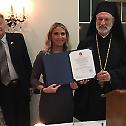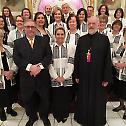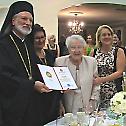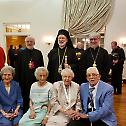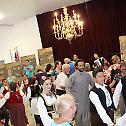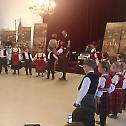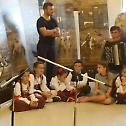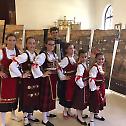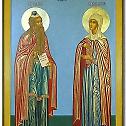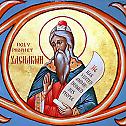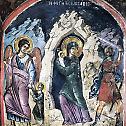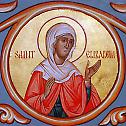Culture
Saint John the Theologian, Apostle and Evangelist
9. October 2018 - 11:22Commemorated May 8/21, June 20/July 3, September 26/October 9
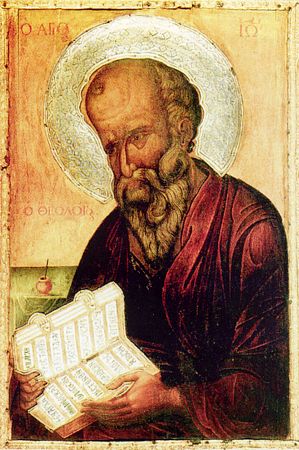 The Apostle and Evangelist St. John, called the Theologian, was the son of Salome and Zebedee. Zebedee was a fisherman of Galilee who possessed rather vast holdings with workers. He was a member of some importance in the Jewish community, having access to the high priest. John's mother Salome is mentioned as being one of the ranks of women who served God with their possessions.
The Apostle and Evangelist St. John, called the Theologian, was the son of Salome and Zebedee. Zebedee was a fisherman of Galilee who possessed rather vast holdings with workers. He was a member of some importance in the Jewish community, having access to the high priest. John's mother Salome is mentioned as being one of the ranks of women who served God with their possessions.
John was at first the disciple of St. John the Baptist. Listening to his witness of Christ as the Lamb of God Who takes away the sins of the world, he, together with Andrew the First-Called, followed the Saviour. Being a steadfast disciple of the Lord, he and his brother James were called by the Lord Himself at a later time after a successful catch of fish in the sea of Galilee. Together with Peter and James, John was deigned worthy to become close to the Lord, being with Him during the most important and triumphant times of His earthly life. Thus, he was worthy to be present at the resurrection of the daughter of Jairus, to see Christ's transfiguration on Mount Tabor, to hear the discourse on the signs of His second coming, and to witness to His prayer at Gethsemane. At the Last Supper he was so close to the Lord that in his own words, he lay his head upon Christ's bosom, whence originated his name "bosom-friend," which has since become a name for someone who is especially close.
Out of humility, not calling himself by name but nevertheless speaking of himself in the Gospel, he refers to himself as the disciple "whom Jesus loved." The Lord showed this love of him when He was on the cross—He entrusted His Most Holy Mother to him saying: "Behold thy mother."
Zealously loving the Lord, John was filled with indignation at those who were hostile to the Lord or who estranged themselves from Him. While traveling through Samaria he prohibited those who did not walk with Christ to cast out demons in the name of Jesus Christ (cf. Mk. 9:38), and asked the Lord's permission to consume with fire certain residents of a Samarian town for not accepting Him (cf. Luke 9:54). For this he and his brother James were called by the Lord "sons of thunder" (Boanerges). Feeling the love of Christ toward himself, but as yet not enlightened with grace by the Holy Spirit, he decides to ask for himself and his brother James a place close to the Lord in His future Kingdom and learns of the impending sufferings for both of them.
After the Lord's Resurrection, we often see Apostle John together with Apostle Peter, together with whom he is also considered a pillar of the Church, and with whom he often travels to Jerusalem. True to the Lord's command, he cared for the Holy Virgin Mary as a most devoted son, and only after her Blessed Dormition did he begin to preach in other lands.
During Apostle John's ministry, one notices that he uniquely chose for himself a specific province and directed all the energy of his soul to eradicate paganism there and strengthen the holy faith. As an example of his specific care were the seven Churches of Asia Minor—in Ephesus, Smyrna, Pergamos, Theatira, Sardis, Philadelphia and Laodicia. He lived mainly in Ephesus.
During the time of Emperor Domitian (81-96), Apostle John, as the sole surviving Apostle, was summoned to Rome and by the decree of this persecutor of the Church was thrown into boiling oil, but the power of God saved him unscathed just as it saved the three youths from the fiery furnace. Then Domitian sent him to the desert island of Patmos. Here John wrote the Apocalypse, or Revelations of the fate of the Church and the world.
After the death of Domitian, Apostle John returned to Ephesus from exile. The Bishops and presbyters of the Ephesian Church showed him three Gospels written by the Apostles Matthew, Mark and Luke. Having approved these Gospels, Apostle John deemed it necessary to supplement that which was lacking and which he knew well, being the last of the living eyewitnesses. This was of great importance, since toward the end of the first century there appeared in the Christian world several active gnostic sects which abased and even denied the Divinity of the Lord Saviour. It was imperative to protect the faithful from that teaching.
In his Gospel, Apostle John explains the Saviour's sermons given in Judea. These sermons directed at the learned scribes were more difficult to understand, and most likely due to this fact were not contained in the first three Gospels, which were designated for the newly converted pagans. Before beginning to compose the Gospel, Apostle John designated a fasting period for the Church of Ephesus and withdrew with his disciple Prochorus to the mountain where he wrote the Gospels bearing his name.
From ancient times the Gospel according to John were called spirit-filled. In comparison with the other three Gospels, they contain more the sermons of the Lord regarding the deepest truths of faith—on the incarnation of the Son of God, on the Creator, on the redemption of mankind, on spiritual rebirth, on the grace of the Holy Spirit and on Communion. From the first words of the Gospel, John elevates the thoughts of the faithful to the hieghts of the divine emanation of the Son of God from the Father: In the beginning was the Word, and the Word was with God, and the Word was God (Jn 1:1). Apostle John expresses the aim of his Gospel thus: But these are written, that ye might believe that Jesus is the Christ, the Son of God; and that believing ye might have life through his name (Jn. 20:31).
Besides the Gospel and the Apocalypse, Apostle John wrote three epistles which were incorporated into the the New Testament books as Ecumenical (universal) Epistles. The main thought in his epistles was: Christians must learn to love: Beloved, let us love one another: for love is of God; and every one that loveth is born of God, and knoweth God. He that loveth not knoweth not God; for God is love (1 Jn. 4:7-8).
Herein is our love made perfect, that we may have boldness in the day of judgment: because as he is, so are we in this world. There is no fear in love; but perfect love casteth out fear: because fear hath torment. He that feareth is not made perfect in love. We love him, because he first loved us. If a man say, I love God, and hateth his brother, he is a liar: for he that loveth not his brother whom he hath seen, how can he love God whom he hath not seen? And this commandment have we from him, That he who loveth God love his brother also (1 Jn. 4:17-21).
Regarding the subsequent ministry of Apostle John, tradition has preserved some wonderful information showing to what extent his heart was filled with love. While visiting one of the Asia Minor Churches, John noticed among his listeners a youth who distinguished himself with unusual gifts, and he entrusted the youth to the care of a bishop as a special ward. Later on this youth got involved with unsavory friends, became debauched and the leader of a gang of bandits. Hearing of this from the bishop, John went into the mountains where the bandits were ravaging, and he was seized and brought before the chief.
On seeing the Apostle, the youth became embarrased and began to run away. John pursued him and with touching words of love encouraged him. He finally brought him to Church, shared with him the labors of repentance, and did not rest until he had totally reconciled him with the Church. During the last years of his life the Apostle preached only one precept: Children, love one another. His disciples asked : "Why do you repeat yourself?" Apostle John answered: "This is the most important commandment. If you will fulfil it, then you wil fulfil all of Christ's commandments."
This love would turn into a fiery fervour when the Apostle met false-prophets who corrupted the faithful and deprived them of eternal salvation. In one public building he met the false prophet Cerinthus who denied the Divinity of the Lord Jesus Christ. "Let us depart quickly" said the Apostle to his disciple "I fear this building might collapse around us."
St. John the Theologian died a natural death (the only one of the Apostles to do so), being around 105 years of age, during the time of Emperor Trajan. The circumstances of the Apostle's death appeared unusual and even puzzling. At his own insistence, the Apostle John was buried alive. On the following day, when the tomb was unearthed, it turned out to be empty. This event affirmed the belief in the conjecture of some Christians that Apostle John will not die but will live until the Second coming of Christ and that he will unmask the Antichrist. The words said by the Saviour not long before his Ascension gave them cause to surmise this. When the Apostle Peter asked after turning to the Apostle John, And what shall this man do? the Lord answered, If I will that he tarry till I come (the second time), what is that to thee? Follow thou me. Apostle John makes a notation regarding this in his Gospel: Then went this saying abroad among the brethren, that that disciple should not die (Jn. 21:22-23).
Troparion Tone 2
Apostle beloved of Christ our God,/ hasten to deliver a defenseless people./ He Who allowed thee to recline on His breast/ receives thee bowing in prayer, O John the Theologian./ Implore Him to dispel heathen persistence/ and to grant us peace and mercy.
Kontakion Tone 2
Who can tell of thy mighty works, O beloved Saint?/ Thou didst pour forth miracles./ Thou art a source of healing and dost intercede for our souls/ as Theologian and friend of Christ.
Steubenville celebrates Choir's 75thAnniversary
1. October 2018 - 15:14The weekend of September 8-9 will long be remembered by the parishioners of Holy Resurrection Serbian Orthodox Church in Steubenville, Ohio as a dual celebration: the marking of their Petar Krstich Choir's 75thAnniversary and the first canonical visit of His Grace Bishop Irinej to the parish.
A highlight of the weekend and a special joy for the choir was the presence and honoring of the founder of the choir, Protinica Miryana Trbuhovich, by His Grace, the parish, the choir, and the entire Serbian Orthodox Church.
American and Serbian Day in the North Port of Sarasota County of Florida
1. October 2018 - 15:09With the blessing of the His Grace the Right Reverend Irinej, Bishop of Eastern America, on September 15, we celebrated the 100th anniversary of Serbia and the United States in World War I.
Sts Joachim and Anna, parents of Blessed Mary (Theotokos)
22. September 2018 - 14:07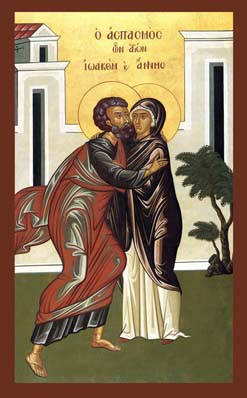 So much attention is paid by Christians to the Blessed Virgin Mary, the Theotokos, sanctified in every conceivable way, that there is a tendency to overlook her parents. Commemorated the day after the commemoration of their daughter, who is remembered on other days as well, Joachim and Anna were the parents of a flesh-and-blood human being they called Mary and, therefore, the grandparents of a flesh-and-blood human being, in form at least, who died to save the world.
So much attention is paid by Christians to the Blessed Virgin Mary, the Theotokos, sanctified in every conceivable way, that there is a tendency to overlook her parents. Commemorated the day after the commemoration of their daughter, who is remembered on other days as well, Joachim and Anna were the parents of a flesh-and-blood human being they called Mary and, therefore, the grandparents of a flesh-and-blood human being, in form at least, who died to save the world.
Considered in this light, this couple is appreciated most by the grandfathers and grandmothers of the world.
The spiritual beauty of St Anna is expressed in the Bible, equalled by that of her devoted husband, the too lightly regarded Joachim. Since there is no greater part of the divine plan of the universe than motherhood, it follows that St. Anna is given individual honour with an observance of a feast day in her name on July 26. This in no way diminishes the image of her husband St Joachim.
Nativity of the Theotokos
21. September 2018 - 13:16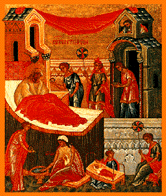 Commemorated September 8
Commemorated September 8
The establishment of four major feast days to honour the Blessed Virgin Mary took place in the days of the apostolic era and have a significance in the Greek Orthodox Church which has remained unaltered through nearly twenty centuries of Christianity. The mother' of the Son of God is honoured on March 25, the day of Annunciation when the Archangel Gabriel told Mary she was to become the mother of Jesus Christ; the Repose of the blessed Virgin Mary on August 15; on November 21, the Entrance of the Blessed Theotokos to the Temple; and on February 2 when the Mother of God brought the infant Jesus to the temple for presentation forty days after His birth.
A fifth day of commemoration is celebrated on September 8, honouring the Virgin Mary on the day of her birth. This day was set aside by the Orthodox Church in the early first century, but not observed until the eighth century when Pope Sergios saw fit to join with the Orthodox during his reign which extended from A.D. 687 to 701. All of Christendom agreed on the date that the Virgin Mary was born, but for some reason the date was not an official feast day in the Roman sector for more than a third of the length of existence of the Christian Church.
Sts. Zacharias the Prophet and Elizabeth the Righteous, the Parents of the Precious Forerunner
18. September 2018 - 15:04The Holy Prophet Zachariah and the Righteous Elizabeth were the parents of the holy Prophet, Forerunner and Baptist of the Lord, John. They were descended from the lineage of Aaron: St Zachariah, son of Barach, was a priest in the Jerusalem Temple, and St Elizabeth was the sister of St Anna, the mother of the Most Holy Theotokos. The righteous spouses, walking in all the commandments of the Lord (Luke 1:6), suffered barrenness, which in those times was considered a punishment from God.

